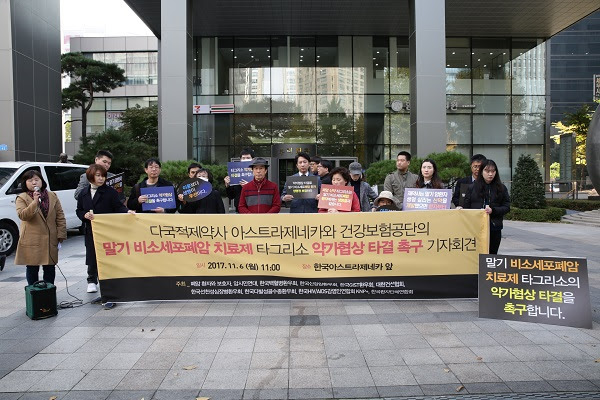A group of cancer patients and their families called for AstraZeneca Korea한국아스트라제네카 and regulatory officials to quickly finish drug price negotiations for Tagrisso, a treatment for advanced-stage non-small cell lung cancer, on Monday.
They held the protest rally in front of the Korean office of the multinational pharmaceutical company in Songpa-gu, southeastern Seoul.
The government has approved Tagrisso (ingredient name: Osimertinib) for treating patients with EGFR T790M mutation-positive metastatic non-small cell lung cancer who are resistant to EGFR-TKI, a second-generation target treatment, such as Iressa (ingredient name: Gefitinib) and Tarceva (ingredient name: Erlotinib).
It is a third-generation anticancer drug, which has proved its efficacy.
According to reports, the drug price negotiation for Tagrisso is in danger of a breakdown, sending patients and their families into despair because of its high price, which costs 10 million won ($8,968) per pack of 28 tablets.
Protestors said that Olita, another non-small cell lung cancer treatment drug, completed a drug price negotiation, at 1.4 million won for four weeks’ administration, on Oct. 13.

Insurance coverage for Olita will begin with just the notification to the Health Insurance Review and Assessment Service건강험심사평가원, and the Ministry of Health and Welfare보건복지부 has been notified. Patients can then pay only 70,000 won, which is 5 percent of the previous value of the four-week drug price of Olita.
Considering the price of Olita, it will not be easy to settle bargaining on Tagrisso unless the drug price is drastically cut, according to a press release from the Korea Alliance of Patients Organization한국환자단체연합회. AstraZeneca and the National Health Insurance Service건강보험공단 are known to show a wide gap between their offered prices of Tagrisso, leading to speculations that negotiations are likely to collapse.
Currently, AstraZeneca is operating a payment support program, which provides the drug for four months’ use for patients who buy it for two months’ use, to relieve part of price burdens. Even taking AstraZeneca's subsidies into account, it still poses a significant economic burden on patients with advanced lung cancer who need to pay an average of 4 million won a month for the drug, they argued.
“If the drug price negotiations in Tagrisso break down, Tagrisso will not be able to receive insurance benefits in this country,” an official from the organization said. “Many patients with end-stage lung cancer who cannot afford large amounts of uninsured drugs will have to give up treatment, and many patients who are treated with high drug prices will suffer because of disastrous financial burdens.”
"Not only the government but also pharmaceutical companies have to prevent unfortunate situations, in which they let patients die of disease or go bankrupt because of unbearable financial burdens,” he said.

